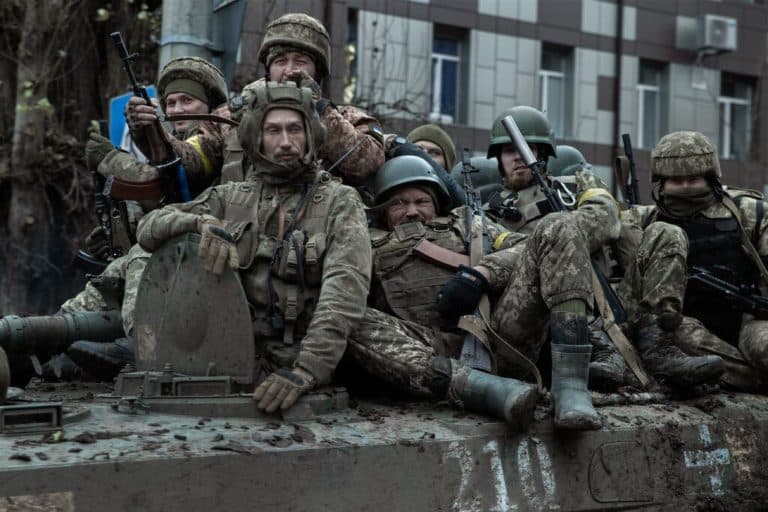Given Ukraine’s surprisingly effective counteroffensive against Russian forces in the autumn of 2022, there has been an increasing focus among Western officials and their media allies about Russia’s probable response to an overall Ukrainian triumph in the war. There has been far less discussion about how the United States and its European partners will respond if military fortunes change and NATO’s proxy faces definitive defeat. However, such a discussion is essential to avoid making a serious policy blunder.
Western foreign policy experts are split about the Kremlin’s probable response if its military venture in Ukraine implodes. Realists are concerned that Russian President Vladimir Putin might drastically escalate the scope of Russia’s efforts. Such concern is warranted. Indeed, escalation already is taking place, with the partial national mobilization that Putin ordered in September 2022, and the intensified missile strikes on Ukraine’s electrical grid and other infrastructure. Some worried analysts have warned that if Russia faces a definitive defeat in Ukraine, a cornered Putin might even use tactical nuclear weapons to avert a humiliating debacle. Even President Biden has noted the existence of that danger.
More hawkish types, though, insist that Putin is bluffing, and they celebrate Kyiv’s counteroffensive as merely the prelude to a glorious overall triumph. Their implicit assumption is that NATO’s military clout will deter the Kremlin from escalating the stakes. Instead, they apparently believe that the Russian bear will crawl away with its stubby tail between its legs, accepting a diplomatic settlement that returns all occupied Ukrainian territory (including Crimea) to Kyiv’s control. Hawks such as Anne Applebaum have insisted from the outset that a settlement with those characteristics is the only acceptable outcome.
The foreign policy blob’s rosy scenario about the likely consequences of a Russian defeat in Ukraine is worrisome. However, the excessive optimism about Kyiv’s prospective fortunes is equally so. The reality is that while Putin clearly underestimated the tenacity of Ukrainian forces (as well as the extent and effectiveness of NATO’s military aid to Kyiv), Russia still is slowly achieving its territorial objectives while devastating Ukraine’s infrastructure.
One key measure that should be extremely worrisome to Ukraine and its Western patrons is the extent of military casualties. An assessment by Gen. Mark Milley, Chairman of the Joint Chiefs of Staff, in early November 2022 concluded that Russian forces had suffered more than 100,000 dead and wounded since the war began. US news media outlets highlighted that number in headlines about Milley’s report. What received far less attention was his admission that Ukrainian forces also had suffered more than 100,000 casualties. That point was significant because Russia’s military is much larger than Ukraine’s, and Russia’s overall population is more than 3 times larger than Ukraine’s. In other words, Russia can absorb such gruesome losses easier and longer than Ukraine can. As the war drags on and turns into a human meat grinder, Ukraine’s fortunes fade, not brighten.
The Biden administration may be cynical about such consequences, since the template for Washington’s use of Ukraine as a military proxy against Moscow was using the Afghan mujahidin in the 1980s to bleed the Soviet Union’s occupation forces. That policy ultimately succeeded, albeit at great cost in multiple respects to the Afghan people. However, as I have pointed out elsewhere, Ukraine is a much more vital interest to Moscow than Afghanistan ever was. Hence, the Kremlin’s willingness to accept a humiliating withdrawal from Ukraine is extremely unlikely.
Moreover, although administration officials may be cynically pragmatic about using Ukraine as a proxy only as long as the strategy proves effective, Kyiv has legions of genuine admirers in the foreign policy blob and the news media. The pervasive, bogus portrayal of Ukrainian President Volodymyr Zelensky as a noble figure akin to Winston Churchill, and Ukraine as plucky liberal democracy resisting an invasion by a vicious aggressor, makes it difficult for Washington to abandon its proxy – even if Kyiv’s fortunes turn bleak. Having argued that Ukraine is on the front lines of a global, existential fight between democracy and autocracy, which the administration and its allies in the blob have done repeatedly, it will be difficult to retreat from that stance.
A very real risk exists that if Russia’s impending winter offensive – or some later offensive – routs Ukrainian forces, there will be tremendous pressure on the Biden administration to intensify rather than reduce US support for Kyiv. Indeed, there would almost certainly be calls for direct NATO military involvement in the war. Escalation could take the form of imposing a no-fly zone over Ukraine or even deploying US combat forces in that country.
The risks associated with such dramatic moves should be obvious and horrifying, but those influential figures who have embraced the war as a holy crusade against Russian aggression and the alleged global menace of autocracy may not be deterred by such considerations. Members of the US foreign policy establishment do not have a good track record about being willing to abandon failed enterprises. They persisted in the Vietnam War for years after it was apparent that Washington’s clients in Saigon could not win. More recently, they stubbornly refused to recognize the bankruptcy of US policy in Afghanistan for nearly two decades.
It is hard to imagine that people with the same mentality will abandon Ukraine after exerting every effort to portray that country as a vibrant democracy and a crucial ally. Indeed, the tsunami of hostility from such quarters to the tepid call (quickly retracted) from the House Progressive Caucus for a greater emphasis on diplomacy to end the war indicates the extent of fanatical support for Ukraine. Calls for escalating Washington’s commitment are likely to be embraced by the blob, despite the excessive risks to the American people. Americans who want to prevent their country from becoming even more entangled in the Ukraine conflict must be prepared to rebuff such efforts.
Reprinted with permission from Antiwar.com.


